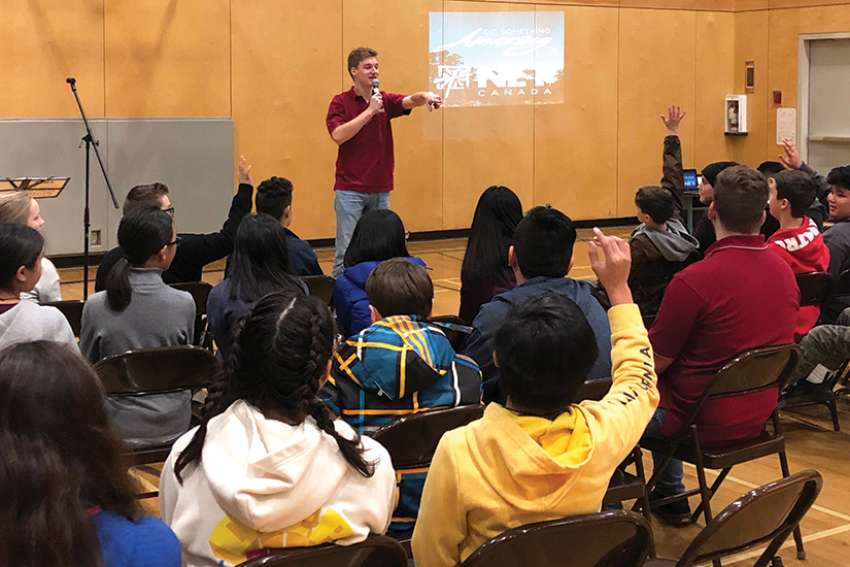Seven young adults with the National Evangelization Team (NET Canada) are leading praise and worship services, retreats and other evangelization events for children and teens across B.C.’s Lower Mainland. Now a grant from the Archdiocese of Vancouver’s Project Advance campaign is going to help them with their audio-visual needs and transportation.
It’s a big help, according to western program co-ordinator Jean Paul de Fleuriot. “Support from Project Advance has really helped us, in a practical way, to share the Gospel with more young people,” said de Fleuriot.
It’s the second year the NET team is receiving a Project Advance grant. Last year, the missionaries — who might travel from Langley to North Vancouver to Delta in a single day — received a $15,000 grant to buy a staff van.
This year’s grant will cover the cost of buying new audio-visual equipment, a piano keyboard and a trailer to carry their supplies.
“We are missionaries first,” said de Fleuriot. “We will share the Gospel with or without a sound system; we want young people to have an opportunity to encounter Jesus, respond to Him and live for Him.”
But that becomes difficult when the team must rely on the various audio-visual systems of schools they visit — which often leads to technical problems — or use the one speaker and microphone they currently own, which is not practical when they lead praise and worship with a full band.
“We’d like to have something that’s effective and that we can rely on,” which means having their own portable audio-visual equipment, said de Fleuriot.
De Fleuriot now works in NET administration, but he remembers hitting the road as a young NET missionary in 2002. His team did not have a sound system; they just used their own vocal chords, a guitar and song lyrics written on giant pieces of cardboard and held up for the students to sing along.
But that approach doesn’t work anymore. “We’re living in an age where society has invested so much in technology and they’re vying for young people’s attention,” he said.
“More and more, things are getting professional in the ways they are marketing to young people. If we come along and we’re not professional in the ways we’re presenting ourselves, they won’t take us seriously.”
The students they minister to live in “a visual culture,” he said. “When we’re on a retreat and we can show a video on a projector and have the sound coming out clearly, that they can understand the Gospel message in a way they can relate to is very important.”
About two-thirds of NET’s budget comes from personal fundraising efforts by missionaries and staff. The other third comes from the fees they charge for retreats and other programming.
Without the Project Advance grant, de Fleuriot said he’d have to put many hours into organizing an extra fundraiser and hoping these needs, over and above their regular operating costs, would be covered.
“We’re very grateful we can be the diocese’s hands and feet in the schools, sharing the Gospel with young people. We’re all on the same team,” he said.
The 2019 Project Advance campaign — the archdiocese’s annual appeal — launched April 6.
“The education of our young people has to be a priority,” Archbishop J. Michael Miller said in a video message about the 2019 Project Advance appeal.
Project Advance has raised more than $7 million each year for the last four years.
Support The Catholic Register
Unlike many other news websites, The Catholic Register has never charged readers for access to the news and information on our site. We want to keep our award-winning journalism as widely available as possible. But we need your help.
For more than 125 years, The Register has been a trusted source of faith based journalism. By making even a small donation you help ensure our future as an important voice in the Catholic Church. If you support the mission of Catholic journalism, please donate today. Thank you.


